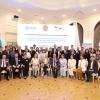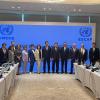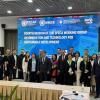News
Displaying Results 1 - 25 of 230
The shift towards the digital exchange of trade data and documents can improve efficiency, reduce costs, enhance transparency, and enable better accessibility to and analysis of data. Furthermore, it has the potential to foster greener and more inclusive trade. Yet, efforts to digitalize data and…
Recent data from the UNCTAD Global Trade Update reveals a promising outlook for global trade. Following a decline in the last year, the volume of world merchandise trade is forecast to increase by 2.6% in 2024 and 3.3% in 2025. One of the most notable trends in 2024 is the significant rise in…
The 2024 UNECE Sustainable Development Goals (SDG) Progress Report shows that the UNECE region is far off-target when it comes to meeting commonly agreed SDG indicators. Spanning across Europe, North America, the Caucasus and Central Asia, Türkiye and Israel, the region is currently on track to…
Responding to the request of the Governing Council of the United Nations Special Programme for the Economies of Central Asia (SPECA), UNECE is building the capacity of public and private experts in the SPECA participating States to use the semantic standards and reference data models of the UN…
Central Asia is well placed to produce fresh and dried fruit and vegetables. Countries like Kyrgyzstan, Tajikistan, and Uzbekistan are important producers of dried fruit, in particular apricots. However, traders from the region have been facing challenges with diversifying their export portfolios…
The transition to a circular economy is pivotal for achieving sustainability goals, especially within the clean tech sector. Platforms can play a crucial role in facilitating this transition by connecting stakeholders, streamlining resource flows, and enabling efficient material reuse through the…
The United Nations Code for Trade and Transport Locations, UN/LOCODE in short, a UNECE flagship product, is a geographic coding scheme that uniquely and unambiguously identifies locations worldwide for transport and economic activities. In its role as a fundamental cornerstone of the global trade…
Addressing the Tashkent International Investment Forum (2-3 May 2024), UNECE Executive Secretary Tatiana Molcean called for the mobilization of private sector investments to support the implementation of the Sustainable Development Goals (SDGs) and to foster regional cooperation in Central Asia.…
In today’s world of resource scarcity and the triple planetary crises of climate change, nature loss and pollution, many efforts are focused on developing new technologies, tools, products, and services that foster circular and sustainable consumption and production patterns across the textile,…
Taking part in the OECD Science and Technology Policy Ministerial in Paris on 23-24 April, UNECE Executive Secretary Tatiana Molcean stressed the need to harness the full potential of science, technology and innovation to facilitate the shift to clean energy, reduce environmental pressures, and…
Increasing the use of digital solutions including those developed by the United Nations Centre for Trade Facilitation and Electronic Business (UN/CEFACT) can enhance the sustainability and resilience of supply chains and strengthen global connectivity.
In a series of capacity-building activities…
The global market for second-hand clothing has been multiplied by seven in the last 4 decades. The practice of exporting second-hand clothing from developed to developing countries has been intensified by the boost of the fast fashion industry, impacting the environment, social and human rights in…
Four years ago, when the COVID-19 pandemic hit, it disrupted the normal functioning of open markets. The ensuing crisis had crippling effects on global trade and productive capacities: it broke supply chains, reduced connectivity and slowed the flow of essential goods. Global food and energy…
Would you trust artificial intelligence (AI) in your heart? This is not some imaginary, science-fiction scenario. Biomedical companies are already developing pacemakers embedded with AI. Digital technologies like AI are also opening new possibilities such as improved management of natural resources…
At the World Economic Forum Annual Meeting in Davos, UNECE Executive Secretary Tatiana Molcean highlighted the role of UNECE’s legal instruments, standards and tools in dealing with the most pressing global challenges, namely climate change, digital and green transformations, low-carbon energy…
Trade facilitation is a potent instrument that can multiply the benefits of trade. Beyond direct impact on economic growth through higher trade flows linked to improved efficiency at the borders, trade facilitation reforms can also contribute to other policy goals. For example, through the…
According to a recently published UNECE Policy Paper, the agrifood, the garment and footwear and the mineral sectors contribute significantly to the economic growth and employment in the UNECE region, while being major sources of global greenhouse gases (GHG) and environmental pollution. Evidence…
Transparency in the environmental performance of economic activities and effective public access to environmental information, especially on products, are indispensable in addressing pressing environmental challenges. This also supports a just transition towards a green and circular economy,…
Discussions at the recent 33rd annual session of UNECE’s Working Party on Regulatory Cooperation and Standardization Policies (WP.6) focused on how to target continued compliance of products with embedded artificial intelligence, reflecting the importance and the challenge that such products can…
Strong private sector engagement positively impacts the relevance, legitimacy, and credibility of national trade facilitation bodies (NTFBs) and encourages a business-centric approach to trade facilitation. Over the past several years, governments, donors and international organizations have…
According to the 2023 Global Circularity Gap Report by the Circle Economy Foundation, transitioning to a circular economy will allow us to fulfil people's needs with only 70% of the materials we currently extract and use. The benefits of the circular economy are tremendous, as it not only addresses…
With a long history of reliance on resource-based industries for growth, countries of the United Nations Special Programme for the Economies of Central Asia (SPECA) - Afghanistan, Azerbaijan, Kazakhstan, Kyrgyzstan, Tajikistan, Turkmenistan, and Uzbekistan - have embraced the power of innovation…
Clothing production has doubled in the past 15 years. In 2018, the fashion industry produced around 2.1 billion tons of greenhouse gas emissions (GHG) – 4% of the world’s total – leading to major environmental, health and social challenges. In 2020 in Europe, textile consumption had the third…
The ongoing repercussions of the COVID-19 pandemic, geopolitical instability, and elevated inflation rates continue to pose challenges to global trade, with the World Trade Organization (WTO)'s trade growth forecast now estimated at only 0.8% this year.
As the global trade landscape grapples…
Decades of unsustainable consumption and production patterns have resulted in the exhaustion of finite resources and environmental degradation. As governments reassess scenarios, the circular economy model - where resources are reused, recycled, and repurposed to reduce waste - has become a pillar…


























